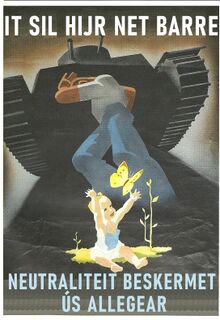Alslandic neutrality
This article is incomplete because it is pending further input from participants, or it is a work-in-progress by one author. Please comment on this article's talk page to share your input, comments and questions. Note: To contribute to this article, you may need to seek help from the author(s) of this page. |

Alslandic neutrality is one of the core tenets of foreign policy in Alsland which states that Alsland will be neutral in any military conflict. The policy was initially drafted by Weranian and Estmerish diplomats during the Neevan Crisis which was intended to make a Delland a neutral buffer state between Werania, Estmere and Valduvia. Delland adopted neutrality after the crisis and swore against military alliances with foreign powers - namely Valduvia. Neutrality was viciously opposed by forces within Alsland including the Alslandic Section of the Workers' International and the National Bloc. During the Great War, the policy of neutrality became popular as it initially kept Alsland out of the war itself. After Gaullica invaded Alsland which was justified to 'protect Dellish Neutrality by violating its neutrality'.
Upon the liberation of Alsland, neutrality once again re-emerged as the state's official policy largely due to the belief of Villem Mand that Alsland's neighbours were conspiring to occupy and divide the country between themselves. The outbreak of the Valduvian-Weranian War reinforced neutrality in the eyes of the government and the public who were horrified by the prospect of another war being fought inside Alsland. In 1954, Alsland successfully pushed for a special resolution within the Community of Nations reaffirming Alslandic neutrality. In the following year Alsland joined the Euclean Community although it consistently rejected membership of the Euclean Common Defense Treaty Organization (ECDTO). Neutrality was once again tested during the Burish genocide when Alsland was faced with a refugee crisis from ethnic Burish fleeing genocide in Valduvia. Whilst it accepted large amounts of refugees, Alsland only recognised the genocide in 1994 after the Valduvian Truth and Reconciliation Commission concluded, for which Alsland's policy was heavily criticised. A key part of Alsland's neutrality has been its policy of having positive and open relationships with its immediate neighbours - Valduvia, Estmere and Werania - this policy has seen Alsland make concessions to its neighbours regarding their bilateral relations including reaffirming its neutrality to all three. Internationally Alsland has maintained this policy on a wider scale having maintained relations with both East Miersa and West Miersa as well as North Kabu and South Kabu. Despite Alsland refusing involvement in military conflicts, Alsland has participated in CN peacekeeping operations, most notably during the Community of Nations Valduvia-Werania Military Observer Group.
Whilst neutrality was initially controversial, since its modern adoption after the end of the Great War it has become an ingrained part of Alsland's foreign policy. In 2021, a poll conducted on behalf of the Ministry of Foreign Affairs showed 71% of the public backed neutrality whilst only 14% were in favour of ending neutrality and entering into the Euclean Common Defense Treaty Organization. In CN votes, Alsland was noted as often takes the middle ground between voting with Valduvia or with the east. On human rights issues it largely sides with its eastern partners although has an unofficial policy of abstention from more controversial human rights votes. Most criticism of Alsland's neutrality is related to its policy of refusing extradition requests.
In 2018 Alslandic President Rita Rebane told reporters in Valduvia that neutrality was not a position of cowardice but one of strength to oppose aggressive diplomacy whilst still cooperating with various nations and alliances around the world and allowing Alsland to have an independent foreign policy.
Neevan Crisis
Great War
Initial neutrality
Post-war policy
Euclean community
Armed neutrality
Criticism
- Genocide recognition
- Extradition